Limited series actresses on the challenges and thrills of playing real people, what they wish they knew, more
One look at the list of limited series that have debuted in the last year — some two dozen of which are based on true stories — and it's clear to see the category will be a hot one at this year's Emmys. Perhaps an even hotter category? The lead actress in a limited/anthology series or TV movie.
That's why EW assembled a group of those actresses — Beanie Feldstein (Impeachment: American Crime Story), Adrienne Warren (The Women of the Movement), Julia Garner (Inventing Anna), Amanda Seyfried (The Dropout), Anne Hathaway (WeCrashed), Elle Fanning (The Girl From Plainville), Jessica Biel (Candy), and Emmy Rossum (Angelyne) — for a wide-ranging conversation about their personal attraction to true stories and whether they'd portray a real person again, the thing they couldn't believe to learn about their characters, questions they wish they could've asked the women they play, whether they'd do a second season (and how), and more.
Plus, on the latest episode of EW's The Awardist podcast, EW critic Darren Franich gives his thoughts on the limited series categories and breaks down the lead actor and actress in a drama race.
Read on for portions of the interview, and watch the video (above)/listen to the podcast (below).
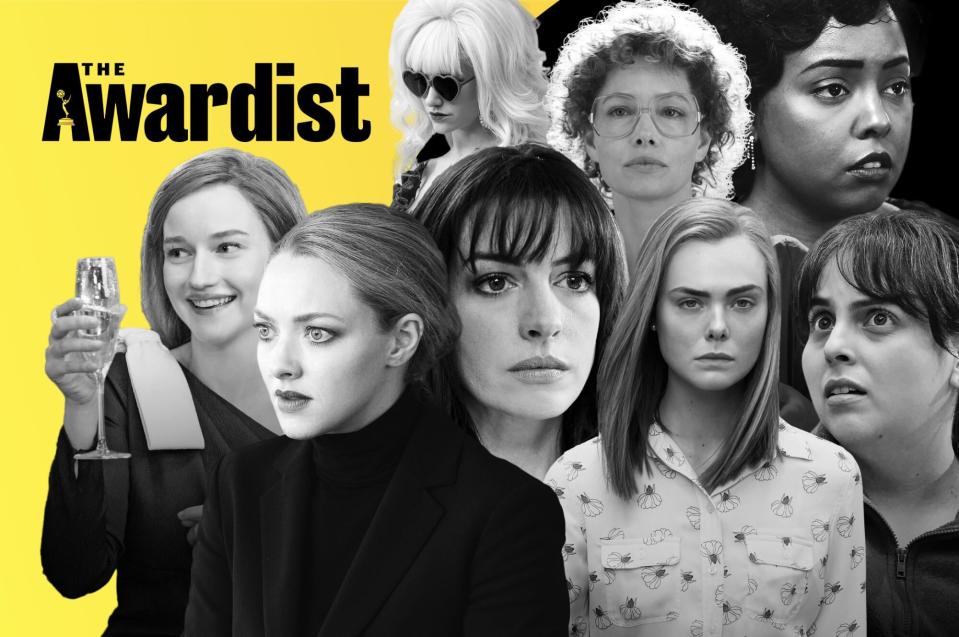
(CCW) Nicole Rivelli/ Netflix; Beth Dubber/Hulu; Apple TV+; Steve Dietl/Hulu; Tina Thorpe/FX; James Van Evers/ABC; Tina Rowden/Hulu; Isabella Vosmikova/Peacock Awardist Limited series actresses roundtable: Amanda Seyfried (The Dropout), Anne Hathaway (WeCrashed), Adrienne Warren (Women of the Movement), Beanie Feldstein (Impeachment), Emmy Rossum (Angelyne), Jessica Biel (Candy), Julia Garner (Inventing Anna), Elle Fanning (The Girl From Plainville)
ENTERTAINMENT WEEKLY: In addition to all of you playing real people this year, there was also Julia Roberts in Gaslit; Viola Davis, Michelle Pfeiffer, and Gillian Anderson in The First Lady; Lily James in Pam & Tommy; Renee Zellweger in The Thing About Pam; Sarah Paulson also from Impeachment; Olivia Colman in Landscapers — the list goes on. So what is it about a true story that makes it so hard to resist?
JESSICA BIEL: I think that the moments where life is stranger and more wild than fiction is something that's endlessly fascinating. We're all students and observers of human behavior. I mean, I'm assuming that's why you ladies love what you do. I love what I do because I just love studying people and, like, stepping in someone else's shoes, especially someone who has lived and walked in the world and has had an experience that I haven't had. And I'm just so curious about that. And there's so much to mine when your character is someone who has existed or is existing currently.
ADRIENNE WARREN: There's so much that we can learn from each other. That, to me, is why any true story that we can tell or put light on a situation that didn't have that light before and share other people's truths, give people an opportunity to be seen in a way in which they feel like their life should be seen, it's such a beautiful moment and such an incredible honor for each of us, as well as a responsibility.
AMANDA SEYFRIED: Playing somebody who is infamous is just like… we're all humans, we're all very, very complicated. And shedding new light or just gaining new perspective, like, we each have our own unique perspective on each character that we play. So when there's somebody out there who the world is aware of, it gives us an opportunity to shed light on a certain facet of that person that we wouldn't necessarily have seen. And that's super satisfying.
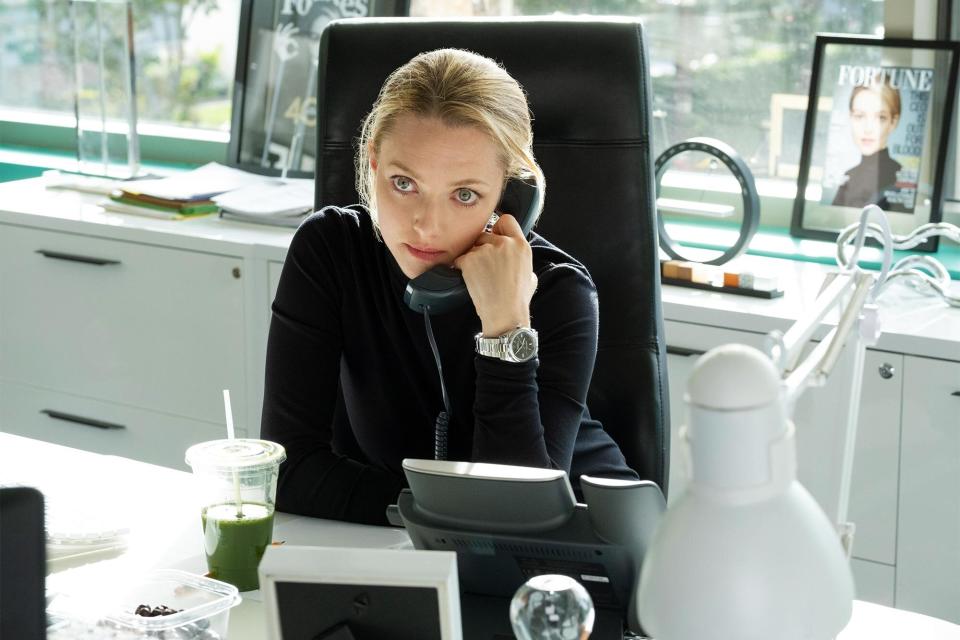
Beth Dubber/Hulu Amanda Seyfried in 'The Dropout'
JULIA GARNER: There's just, I don't want to say there's so many — there's just the lack of truth nowadays, in a way. People are attracted to stories where they're almost catching somebody in a lie because there's so many things that's just lies, lies, lies. Like social media, just things aren't as genuine in a way as much as they used to be. Also, people are attracted to, I don't want to say catching somebody in a lie, but almost like those scandals in a sense. I know I am. [Laughs]
ANNE HATHAWAY: One of the things that was so interesting to me about this character was, what happens when someone doesn't know that they're lying? Or an aspect to themselves is 'fake it till you make it.' And where is that line where a truth that you intend to happen doesn't come true? When do you communicate that to people, or when do you keep doubling down and betting on yourself? And when part of dreams are based in delusion inherently, how do you navigate that? But that was one of the things that was interesting to me about playing someone real, was just what you were saying, Amanda, about how people are multifaceted, how people are human beings. And then I feel like, I don't know if anybody else feels this way, but I felt like my character was someone I met through the media and who she actually was was very different than how the media portrayed her. And it was really interesting to me to try to get more of her and more of that dimensionality in there.

Apple TV+ Jared Leto and Anne Hathaway in 'WeCrashed'
EMMY ROSSUM: The character that I'm playing is somebody who desires to be two-dimensional, desires to be unknowable, [thinks] there's safety in not being human. And so to play someone who's so incredibly secretive of their truth, who's constantly kind of spinning these fantasies and self-mythologizing because that is their own emotional survival ... because the pain of being alive, of being mortal, of being in a human female body, of existing in the patriarchy, of existing as a Jewish woman, all the threats that come with that are too poignant to bear. And the idea that you could create and commit to this version of fantasy was really fascinating to me. And the idea that perhaps there could be just as much or even more emotional truth to be found in the stories that we tell to ourselves and about ourselves than just a whole bunch of facts. And so in that way, I think you're never going to be able to tell a true story the way it really happened, because there are so many people who are there who viewed it differently. And that's why I think that in a sense, it's always a failure to do a biopic, right? Because you're never going to capture every little nuance. And we are so much more than just kind of a two-dimensional number of things that happen to us. But I think that the attempt to bring humanity and adapt and poignancy and honor to a woman's story is really, really valid and something that I think all the ladies here did so incredibly well.
Adrienne, this is not the first time you have played a real character. You came off of kind of being and absorbing everything you could about Tina Turner for several years before you did Women of the Movement. Was there anything specific that you took away from that experience that you were able to apply to portraying Mamie?
WARREN: They're very different people, but I approached them the same. And for me, it was about the truth of honoring their stories and who they are. A lot of my work is about shining light on women's stories who aren't told specifically in history and specifically as a Black woman, as a woman of color. I think that is part of my purpose, as an actress here on this planet right now. And I hope that there will be moments where we can get even more nuanced stories about women of color. But the truth is, I'm telling a story about a woman whose son was murdered, lynched, and she made a decision to start the civil rights movement. And that is in all of my work after that. And everything that I've been asked to do about after that has been about his historical Black women that is had to push through and persevere to push through. And it's never actually been about them. It's never actually been their story or their choice. It's been about what has been oppressed upon them and how they overcame it and how they continue to overcome. And so for me, it was really just about finding the truth for both of them, because they were both oppressed in ways that are unimaginable and came out on the other side as warriors. But unfortunately, in storytelling for women of color, you get to say that we're superheroes, but you never get to see how we get our capes. And that is something that I will always say, and I will always be so proud and honored to get an opportunity to widen the lens so that our society can actually look at women of color and say, "Oh, they feel too. They bleed too. They cry too." And that pain is just as resonant for all of us.
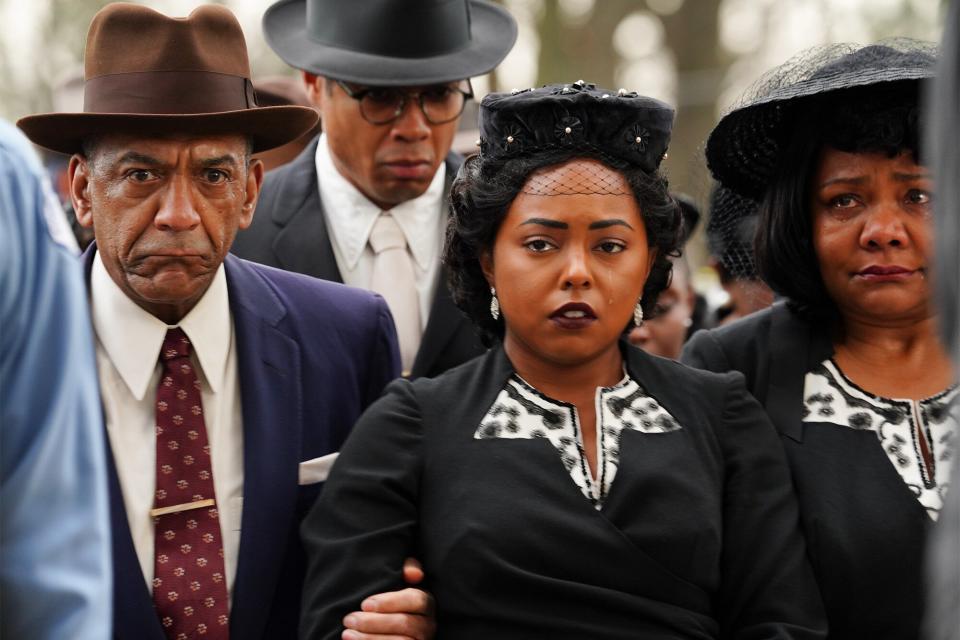
ABC/James Van Evers Tony Vaughn, Adrienne Warren, and Tonya Pinkins in 'The Women of the Movement'
As each of you learned more and more about the people you were portraying, what was the thing that you perhaps found the hardest to believe, to wrap your head around?
FANNING: When Anne was talking about the media, I can relate, because in Michelle Carter's case … the media really portrayed this case in a very one-dimensional way. And I really didn't know much about her except for the very kind of biased, one-sided depiction that they showed. So I guess for me, everything that I found out along the way was kind of a revelation and helped. But I mean, I think for me, it was hard because I'm playing a character that I don't necessarily agree with what she did, and what she did was really in a lot of ways, very unforgivable. And as you know, with these text messages and we had access to them and reading through them was extremely intense, but also it's these teenagers who are also falling in love at the same time. So there's like a silliness to them and kind of this dark secret conspiratorial aspect to them. And I really got to know her through the text messages, much like their relationship, because they only met a handful of times. So that was kind of the most interesting part to me. I think we could all probably agree that we can't really judge who we're playing. But I did have to understand her, if you don't agree with what she's doing or what she did, that's that. But I had to try to get to a point where I kind of understood how she could make the decision that she did, which was an interesting place to live in. And I think for the writers too, and I don't know if everyone feels this way, but we all are playing these real people, but at a certain point you kind of have to disconnect from the real person. You're like, okay, now I need to just focus on the script and create a character in my mind. Because I think someone said, but we never are going to know the full truth and the nuance of the truth. And so at the end of the day, you have to find an arc for how they got there and also make some things up and make some bold decisions as an actor. You're like, I'm going to decide this is what she was thinking. I might not know, but you have to decide it.
SEYFRIED: I have a question: was it hard for everybody just to, like, leave at the end? It just felt like this was, for me specifically, the most work I ever put into something.
GARNER: Yeah, I'm just getting activated by that question. Like, was it difficult for everybody and stressful to be like, "Oh my God, are they going to hate this performance?" Because they are alive too. And it's kind of one of those things that they're are such interesting characters. Like in a way, I mean, I was kind of stressed out.
FANNING: Were you thinking more about the real person?
GARNER: Yeah, the real person. Like, I hope that they're going to like how I portrayed them, in a way.

Aaron Epstein/Netflix Julia Garner in 'Inventing Anna'
SEYFRIED: At one point I was just like, "F--- her." We have to collaborate over here; like, she's over [there]. It's so much trickier than I thought was going to be.
BIEL: I definitely wanted to say that many times, like I don't care what this person thinks. I'm also creating my version of who she was. My character, we're existing in that world, in that moment of her life back in 1980. Social media was nonexistent. So I had a different experience with that. But I would at the end of the day think, "Are we bringing up this horrific story for so many of these surviving family members and community members? What are they going to think?"
FELDSTEIN: I had such a unique experience because Monica [Lewinsky] was a producer on the show. We have this really unique bond, but I think she would say the same thing, that working on the project was simultaneously, like, a lot for her emotionally to kind of go through her trauma again through watching me go through it physically. But it's such a unique experience 'cause you guys use that app Marco Polo where you can like send videos? So she loves it. And so she would send me a video and then I would go to respond to her and I'd be like, "I'm wearing your hair. I can't respond." In her work outfit with her badge on and like the wig and I was just like text her like, "I'll call you later." Because I think this might be bizarre for me.
ROSSUM: Although Angelyne was involved in our production, she didn't want to be involved with me that closely because the version of her that I'm playing is the icon of who she is and not the woman that she is through the guys and the lens of so many different people's perspectives and storytelling of her. So my version of her over like 50 or 60 years changes, depending upon who's in control of the story. And when I met with her, I mean the first thing she said was [speaking in Angelyne's high-pitched, almost squeaky voice], "So why do you have such a hard on to play me?" And then I was like, "I mean, that's why — you're incredible. And you're in control in every situation you're in." And then she said, "I want you to tell whatever version of the story you want to tell. And in that way it's going to be your story and not my story because only I can tell my story." So it was really empowering in a way to be freed from that, to know that the things that I saw in her, the things that deeply moved me and inspired me and caused me to research and become enamored of and almost forget who I was in the process, right. Like that said more about who I was, right, in this kind of marriage of our souls and this kind of imaginary character soul. And in that way, all of these characters are kind of like emotional impressionism more than they are us becoming somebody else who exists out there. And that, I think there's a freedom in that.
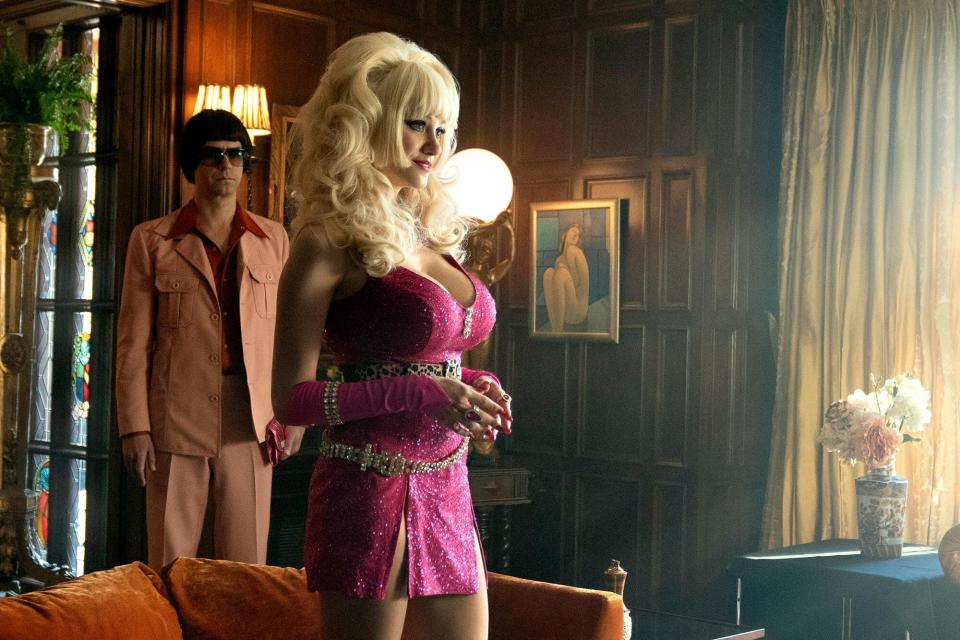
Isabella Vosmikova/Peacock Hamish Linklater and Emmy Rossum in 'Angelyne'
HATHAWAY: I'm just having such an amazing time listening to everyone articulate it, 'cause it sounds like we all kind of followed a similar path in this one. And everything everybody said, I hear and yes, I had my version of that. The one thing that I had that was slightly specific to my character was she was very into Kabbalah and I read a book about Kabbalah and one of the things I read was to humiliate someone is on par with murdering them. And so I had this real awareness every day. I'm like, how do I just hope she knows I'm not here to humiliate her, because as someone said and talked about taking bold swings and making bold choices, and you do have to do that when you're playing a bold person, but also be sensitive to the fact that, I mean, nobody can never listen to their own voice. You can't look at a picture of yourself without being critical and now you're showing someone else's life and your interpretation. And so all the choices that I made, and we had so many meetings about this as a team on this project, was about how do we tell what happened without humiliating everybody? How do we show that these were people who, whether or not they made the right choice or the wrong choice, or however you feel about their choices, they really were grounded in a desire to do good. We wanted to show that without judging how close they came to the mark that they set for themselves.
GARNER: When I met Anna Delvey, I had a weirdly similar kind of conversation [to] what you're saying. She was asking me how filming was going, and she was asking me how I'm going to play her. At that time there [weren't] a lot of interviews with her, and people knew about her but she almost was appearing like a character and they didn't know her story. And I just said, "Listen, my job is to make you a human and you don't have to like that person, but you're not a person right now, in a way." And going back to what you were saying of the humiliation, I think the lack of acknowledging that person is a person in a sense. You know, humanizing them and you know, our job is you don't have to love our characters. You can actually, like, hate the characters that you're watching, but you have to be willing to understand why they did what they did in some regard. So I think that's the main thing in a way. And it's going back to what you're saying with the humiliation, you know.
Elle, the Glee scene, where Michelle is in the mirror — were you already a fan of the show? Did you go back and watch that a lot to get down that Rachel Berry delivery in that moment?
FANNING: Yeah well, I mean, I'd seen Glee, but I wasn't a Gleek. That was kind of one of the things that really got me inside her to understand was her obsession with pop culture and the YA world and Glee. And she was very much a loner in high school and in her life. And I think she sought out those books and Glee in particular to be the star of her own show. It was a kind of obviously playing a character and not wanting to be a character or mimic the character, but getting her mannerisms down. But along with this scene where I'm literally [doing] the gestures and every single time Rachel Berry would close her eyes and when she would get emotional, I wanted to match it exactly. So it was very technical. And I had like a little notepad of, I wrote it out and I would film myself like at night doing the "Make You Feel My Love" and like knowing where I would need to get emotional at the moments that she has tears fall. And then I would watch myself back next to the computer screen of her doing it so we could nail it because I think the eeriness of that, of it being so specific and it mimicking exactly, is what I wanted to pinpoint. It's kind of the turning point of the series where you start questioning my character's motives, where it's really someone mimicking grief.
Beanie, if Monica hadn't been involved in Impeachment, would you have been involved?
FELDSTEIN: Impeachment is the third installment of American Crime Story and this was the first time they've ever actually had a real person involved. So I think the answer to that question would be like, I would've had to have read the script and seen what the perspective of the show was. And Sarah Burgess, our incredible writer, she had such a fierce understanding of Linda [Tripp] and Monica, and it was so firmly rooted in the women's perspective. Even though it's called the Impeachment of William Jefferson Clinton, it's about the women around him — it's not the story of Ken Starr versus Bill Clinton, or Newt Gingrich versus Bill Clinton. It's the story of a friendship that went so, so, so, so, so deeply awry. It was turning the spotlight of the story that we think we all understand kind of on itself and back to the women that really are the reason that this happened. You know, Monica was like a meal for society to feast upon. She was just meat. She wasn't a person. She wasn't a 22-year-old woman. She was just fat and Jewish and spoiled and all of these things that they called her. So I could only have ever been a part. I had always wanted to play Monica; she was a person that kind of stuck out to me of like, maybe I could play Monica Lewinsky. I know she liked to sing. And she grew up down the road for me, and we're both Jewish. I was like, I think I could play Monica Lewinsky, but I didn't understand why. And I certainly would never have done it if it wasn't... if it didn't illuminate the power dynamic of a 22-year-old girl and an almost 50-year-old man. Even if you take out the fact that he's literally the president of the United States and she is his intern, if you just look at the gender and the age of those two people, it's one of the clearest power imbalances of all time. And she was really ripped apart by our media and our society, like as a game. And so it was an honor to show the human behind that. Monica was really serious about her bad choices being in there as well as her good choices. Because if you only show her good again, that's also a two-dimensional portrait. It's just a good two-dimensional portrait versus the bad one that was given to us for so long. She said, "No one's going to believe it if it's only good about me, it has to be the real thing. Has to be the real thing."
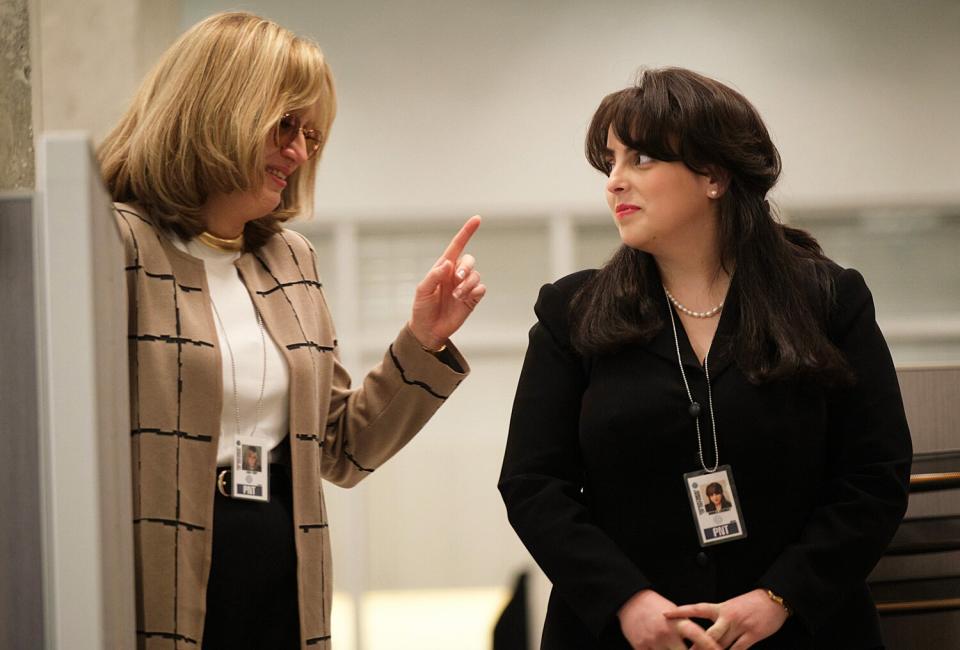
Tina Thorpe/FX Sarah Paulson as Linda Tripp and Beanie Feldstein as Monica Lewinsky in 'Impeachment: American Crime Story'
For those of you who didn't get to meet the person you portray, if you could have met them and asked one question — Adrienne, in your case, maybe this is even just the family — what would that one question have been?
WARREN: I was terrified to play this role for many reasons. I don't know if I would've done it if the family wasn't somewhat involved. And also this was a story that I felt was so deeply rooted in the history of the Black community in this country. And it was the first time it was being told in the way in which it was being told and Emmitt's body being seen on network television. Terrifying. And I think I would've just asked maybe, "What makes you happy?" Because I can't even tell you besides her son. I don't know what makes her happy, what makes her tick. Because so much of it was about the story. Her story is wrapped up in what was done to her and her family. And I just, I want to know about her, more about her. And even though I learned so much about her as a human being, obviously because I had to do this work and tell this story, I had to look at it and do this work from the perspective of, at this time in her life based off what was happening, she had to persevere and she persevered in this way. Every time was about, "I have to get to work. I have to get to work. I have to get to work, to find justice for my boy." That was literally it for every scene. And so in a way, I'm like a little jealous because I don't know. I don't know enough about her. Just that 33-year-old woman. I don't know enough about Mamie still.
BIEL: It's a fabulous question, but it's a really hard one to answer. And I was sitting here thinking, "Would I have had the guts to ask her, ask Candy, Did Betty actually come at you first? Did she threaten you first?" I just don't know if I would have the guts to ask that blatant question. I don't know. Of course, I want to know that answer, but the other question that just popped into my head — and I'd never, well, I've thought of this before, but I never thought that this would be an important one to ask her — but I feel like this relationship that Candy had with her very good friend and her pastor, Jackie Ponder, when Jackie left town, what I have read about that relationship and that friendship was that it was a huge abandonment for Candy where she lost her support. She lost her female crew. She lost her bud. She lost her bestie. And I deeply feel that if that person hadn't left, that what happened would not have happened. And I think I would want to ask her about that relationship,and if she felt that the rug of her life got sort of yanked when that female support system was out of her life on a daily basis. I just know what the women in my life have been for me. And even just sitting here, listening to all of you guys, I just feel like I have this support system, all of a sudden. I know not all of us know each other that well, but I just wonder how often people make decisions in their lives when that female support gets taken.
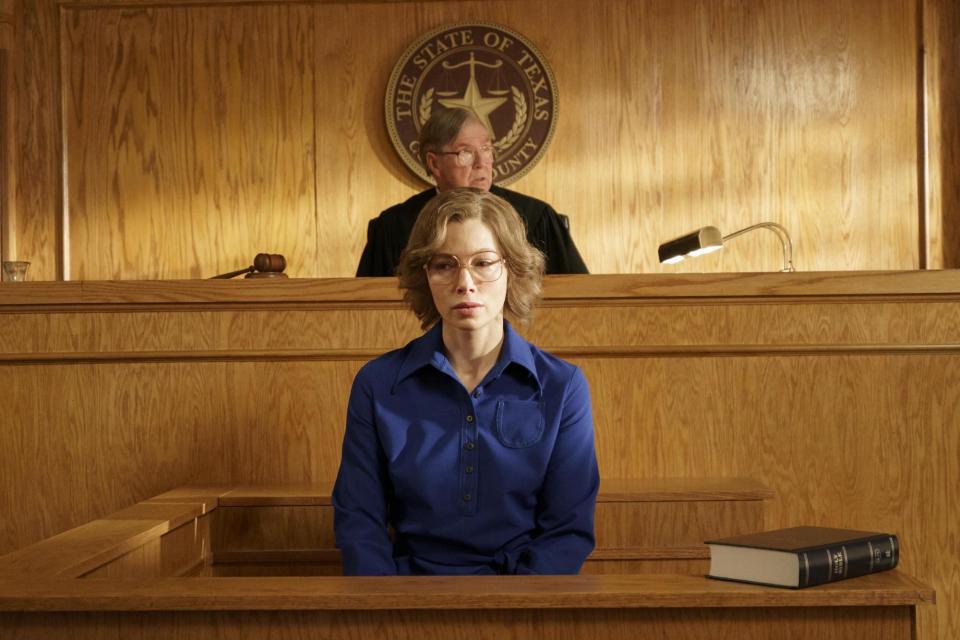
Tina Rowden/Hulu Jessica Biel in 'Candy'
FANNING: I don't know if I would have the guts, but I started thinking about her eyebrows and the court scene. And why she drew them on like that 'cause it was makeup and I have my theories. I thought it was like kind of armor in a way because she looked like so many different people. But I think she was such a kind of fairy nymph at that time in court. She really had this delicate face. I think the harsh eyebrows really did a lot — she didn't show a lot of emotion and had like kind of those smirks and things — and I'm curious why she drew them on. I felt like they were like war paint because it's like, she's going in and she wants to kind of get herself ready for battle every day. But that's my theory. I guess I would ask that. But thinking about the eyebrows, I think also looking at everyone's kind of physical transformations that they've made for the roles this year, it's interesting 'cause I'm like, you guys all don't look exactly like your characters right now. I think it just is such a testament too, to just totally getting evaporated into that role. And I think it was like the first time for me that I actually played a real person, that was kind of people knew what she looked like and who was still alive. And I never had to really transform in that way of where people would probably be online later comparing you to the real person and trying to get that right and how accurate we all wanted to be. I mean, it seems like we all wanted to be pretty accurate because everyone really was, I feel. But I liked that feeling — I never got to do that before.

Steve Dietl/Hulu Elle Fanning as Michelle Carter in 'The Girl From Plainville.'
HATHAWAY: My question would just be pretty practical. I work with an amazing researcher named Amy Hammond who, by the way, if any of you guys need a researcher, I can't recommend her highly enough. She was brilliant. And she helped me organize Rebecca's life into three distinct sections. And Amy will find out as much information as is available. And the middle section, [Amy] was like, "There's really very little evidence of what she was up to." So I would just love to know what she was up to for this period of her life. No one really seems to know, there's a mystery around it. And so I think as we were saying earlier, you kind of have to fill in some of the blanks for yourself and make decisions for that. But I don't know what happened to her just before she met the man that would wind up defining so much of her life.
Amanda, did you meet Elizabeth Holmes?
SEYFRIED: No, no. I don't think I would've been able to play her with the kind of abandon that I was able to cultivate in my process of researching and stuff. If I had met her because I would've felt like I'd owed her more than I did, and I know that about me. I wasn't given the opportunity to meet her because she was in litigation. But we have one person that she's friends with, that I am in contact with, and he would give me some messages every once in a while. And she did say she would love to have coffee with me after the trial.
BIEL: Whoa.
SEYFRIED: And I was like, I don't think that's going to happen. But at the end of the day, I'm glad I didn't have the opportunity because it would've been a hard decision to make and I'm glad it was made for me.
Michelle Pfeiffer, when we did the roundtable for The First Lady, I want to read you a quote she said about playing a real person. She said, "It's very, very weighty. And it's with you all the time. Every choice you make and you just want to honor that person you're playing, you want to be as authentic as possible, knowing that there will be times where you're not and you can't be. I'm never doing it again." Some of you have kind of mentioned some of that stuff, but it's that very last line, "I'm never doing it again." I know everyone's experience is different, but are there any aspects of that you would relate to? Would any of you — show of hands — not care to play a real person ever again? [No one raises their hand.] You'd all do it, it seems.
WARREN: I definitely need a break. [Laughs]
SEYFRIED: I feel like I only want to play real people. I'm having those teeth falling out dreams more than I ever have [on this current job with Emmy] — I really do think it's tied to the fact that it's my first job after playing Elizabeth Holmes, and I can't get a f---ing sense of this character. Now at this point, I'm like, "I'll take anybody. Just say a name and I'll go study that person." Because I think it was so fun.
ROSSUM: It's tricky also with the job that Amanda and I are doing because we're playing characters that are kind of loosely inspired by people, but not really at all of them. So with this one, at least for me, I actively didn't do a lot of research because I just wanted to go to the page and figure out who they were on the page because they don't have their name. They don't have their story in their life. They're not from the same part of the country. And it's not the same. And so I was like, "Okay, this is a character for me. This is not this woman." And I got freedom in that too.
SEYFRIED: What about if there was a season 2 for anybody, any of your characters. Would you do it again?
ROSSUM: Yes.
[Julia and Adrienne emphatically shake their heads no; Elle slowly nods yes.]
HATHAWAY: Yes.
BIEL: Yes. I don't know what there would be to tell.
SEYFRIED: If they came back with, like, a special and they're like, "Okay, you get to play this character for two more episodes."
ROSSUM: A Christmas episode.
GARNER: Yeah. Just imagine if Elizabeth and Anna [are] in jail. In jail, that's season 2.
HATHAWAY: Oh, my God. What if we all played our parts, but that's the movie?
GARNER: That's the movie.
HATHAWAY: We're all those characters together in one.
SEYFRIED: Definitely a fever dream.
HATHAWAY: There's dancing.
GARNER: They're all in the same prison.
BIEL: Oh my gosh.
WARREN: And Mamie's the lawyer, Mamie's definitely a lawyer.
SEYFRIED: And Monica is too.
FELDSTEIN: Yeah, Monica [could be] a lawyer.
There's a multiverse in which that could definitely exist.
HATHAWAY: And Gerrad, could I just jump in with something.... 'Cause you said something great and I really want it to be true, that there's no shortage of great roles for women, but that's just not true across the board for everybody. So I just want to say that there's a really promising uptick in great roles for women, but we have really far to go and I just want to encourage anybody watching this to do whatever you can to level that playing field, because it isn't there yet.
Check out more from EW's The Awardist, featuring exclusive interviews, analysis, and our podcast diving into all the highlights from the year's best in TV.
Related content:

